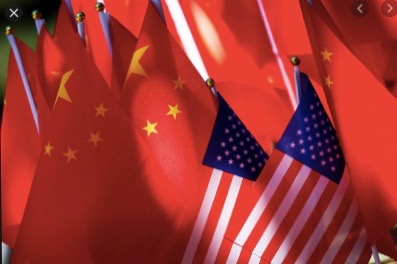TOM PLATE WRITES – On one hand, let me ask you: Would you be foolish enough to persist in advocating a balanced-sensible approach to the People’s Republic of China amid this murderous coronavirus-crisis for which so many blame the PRC? At a time when global suspicion and recrimination converge on Beijing/Wuhan as the perpetrator of the pandemic? At this overheated juncture when China-fearers/bashers do not hesitate to somehow paint the cruel coronavirus invasion as if a modern-day Hitlerian intubation of Europe (authoritarians being all alike, etc. – always invasive)? In this poisoned atmosphere, would you be so foolish as to try to buck the anti-China fever, as I will here?
I thought not.
And especially if you are in Hong Kong: Every month the trend line for the ‘one-country, two-systems’ trope looks more like a slippery slide into ‘one country and just shut-up’. The roundup of anti-government critics and protest leaders, even if designed by the H.K. government to double-down on security, only adds to the optics of an Evil Beijing. In fact, China is starting to lose a measure of international esteem, and one special person,in particular, needs to review the downtick. Climbing to emperorship in 2012, Chairman Xi Jinping, all but worshipping the Party, pointedly intruded CPC functionaries into business sectors, narrowed the intellectual broadband of its best universities, arrested anyone thought corrupt (or seriously irritating), and tested the boundaries of China’s sea and economic adventures. And his China looks to have unleashed the new viral beast while telling the world with all the speed of a backlash of taffy.
Though President Donald J. Trump claims a good relationship with Mr.Xi, almost no one in Washington now publicly claims that China’s continued rise is good for the U.S. Almost anyone trying to offer a balanced view on China these days runs the risk of being viewed as unbalanced. Even otherwise sensible Americans are “recalibrating” where they stand as they tack ever closer to the new dark conventional view. For a sophisticated counterview, the most enlightened assessments of China’s future tend to come from scholars and journalists in the Asia-Pacific region itself. Living much closer to the awakened giant, they have a lot at stake and know they must get it right.
In terms of getting it about as right as one can, many Asians can point to the literary crusade of Kishore Mahbubani. In fact, he has been a wonder: the first dean of the Lee Kuan Yew School of Public Policy, the former Singaporean official and ambassador to the UN, and the author of a bookshelf of original, delightfully feisty thinking about China, the U.S. and Asia. For my university students, his collection of astonishingly original perspectives ‘Can Asian Think?’ (1998) and his more recent ‘Has America Lost It? (2018) proposed a wild party of fresh thinking. He can be brutally blunt, with a ready prickly needle for Western hot air balloons. Though denounced as anti-American by some, he always has something to say, and often not what you expect; his unconventional deep thinking is wise to the future into which our university generation is about to be pushed, now perhaps sadly unwillingly. Professor Mahbubani’s latest work, just-published, is longer, more detailed – nearly comprehensive in its overview of East-West relations: ‘Has China Won?’. But it is still, thankfully, deeply irreverent, even as its timing is deeply problematic. It lands on the glacier of the glum emotional downside of the U.S.-China relationship.
The truth is that China is a frightfully hard sell in the West now. Cross-Pacific paranoia is at a peak. It is said that U.S. intelligence is aiming to figure out whether there was a coronavirus leak at a Wuhan lab, and even whether it was deliberate – as if an under-the-table invasion. Silly? Right now, more than half the polled U.S. public appears to buy into this sort of suspicious scenario.
With China shoved in our face like a doppelganger of the former Soviet Union, the U.S. political establishment conjures up a recycling of the intellectual ghost of the late George Kennan, who articulated the idea of “containment” as the strategy most likely to prove effective given the Soviet hulk. By contrast, Mahbubani promotes the need to avoid fighting that last big superpower war and to accept the inevitability of the rise of China – and Asia. Rather than aim to out-muscle history, better to be like water (as someone once put it) and avoid a confrontation that the West cannot possibly afford to wage, but also cannot afford to lose. This is the carefully-dawn Mahbubani marker.
In explicating China’s rise, there’s more than a touch of Hegalian-style inevitability, but no trace of Marxism. A product of Lee Kuan Yew’s Singapore, with its bespoke city-state capitalism, the scholar-pamphleteer is hardly pro-Communist but openly pro-Chinese. For him, China’s life-force is anything but communistic and is all about being Chinese. As he writes: “Unlike the Soviet Communist Party, [the CCP] is not riding on an ideological wave; it is riding the wave of a resurgent civilization … the strongest and most resilient civilizations in history.”
And so – on the other hand – maybe now is precisely the right time for more Mahbubani, after all. For if, perhaps, we can accept China at its worst, we will be better able to appreciate China when at its best. How often do we come across a writer who revels in discomforting truth-telling and yet still provides a sense of comfort due to his clarity of vision as to where we might be headed? Professor Mahbubani is, I believe, on the right side of history.
The original version of this column appeared earlier in the week in the newspaper South China Morning Post, where Professor Plate has been. regular contributor since 2017. Tom Plate is the distinguished scholar of Asian and Pacific Studies at Loyola Marymount University and vice president of the Pacific Century Institute. His most recent book on China and the U.S. was titled ‘Yo-Yo Diplomacy.’

